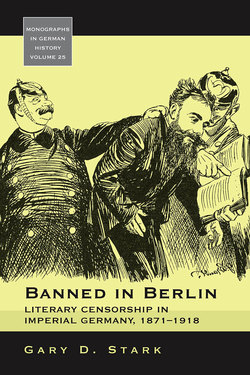Banned in Berlin

Реклама. ООО «ЛитРес», ИНН: 7719571260.
Оглавление
Gary D. Stark. Banned in Berlin
Отрывок из книги
Monographs in German History
Volume 1
.....
Such legalism served to curb arbitrary, capricious, impulsive, or idiosyncratic actions by the censoring authorities. Yet Germany's decentralized federal structure and the resulting fragmentation of its legal and administrative systems created a certain confusion, unpredictability, and even arbitrariness concerning censorship decisions within the nation as a whole. Laws, legal procedures, censorship policies, and criteria for granting theater licenses differed from state to state and frequently from city to city; as a result, authorities in different places regularly made very different decisions about the same work. At the same time, however, the legal peculiarities of some regions and the absence of any uniform national approach to theater censorship created enclaves where censorship was negligible or even nonexistent and islands of tolerance or immunity where it was difficult to convict for a press offense. As shall become clearer in subsequent chapters, this diversity and disunity of censorship laws and practices, while certainly frustrating for German writers and theater operators, served also to protect their freedom of expression.
Although in the years before World War I theater censorship decisions were becoming more centralized within Prussia, Saxony, and Bavaria, and more coordinated between these states, several attempts to establish a more nationally unified censorship system were successfully resisted by various interests. The issue was part of the larger unresolved problem of Germany's national unity and as such was caught up in the empire's constitutional deadlocks, where the powers of the central state (the imperial government) stood against those of the local states (especially Prussia and Bavaria), and the powers of the monarchy, administration, and police contraposed those of the Reichstag and judiciary. Efforts to centralize and standardize censorship laws, particularly theater censorship, miscarried also because ultimately they contravened the legal basis for censorship: to protect public peace, security, and order. To justify banning the public performance of a drama and to have it upheld by the courts, authorities had to argue persuasively that the piece was likely to lead to a public disturbance or somehow cause harm to the audience. This in turn depended upon many contingencies: the nature of the audience; the nature of the surrounding community (or in more modern parlance, “community standards”); unique political, religious, social, or other conditions in that place at that particular time; and so on. Germany was extremely diverse: the populace of Berlin differed enormously from that of Iphofen, Bavaria, and conditions in Hamburg were not like those in Krotoszyn, Posen. The more censors could point to specific local situations as grounds for their actions, the easier it was to defend them; where the situation was different and the work posed little or no threat to public order, a different decision would be in order. However much some groups, whether on the Left or the Right, desired more consistency in censorship decisions, the great diversity of local situations made it difficult (if not impossible) to establish uniform national standards and have all decisions made from one central office. Faced with the difficult choice of local diversity and contradictory censorship decisions on the one hand or more uniformity, consistency, and national predictability on the other, the government usually preferred the former, while many on both the Right and the Left, having lost confidence in local decision making, preferred the latter. Substantial changes to the censorship system became possible only after the outbreak of the war, when the exigencies of national mobilization and the need for more administrative centralization and bureaucratic intervention allowed the military to sweep aside legal technicalities, long-standing constitutional balances, and deference to local considerations. Only then did the system become more uniform and centralized.
.....